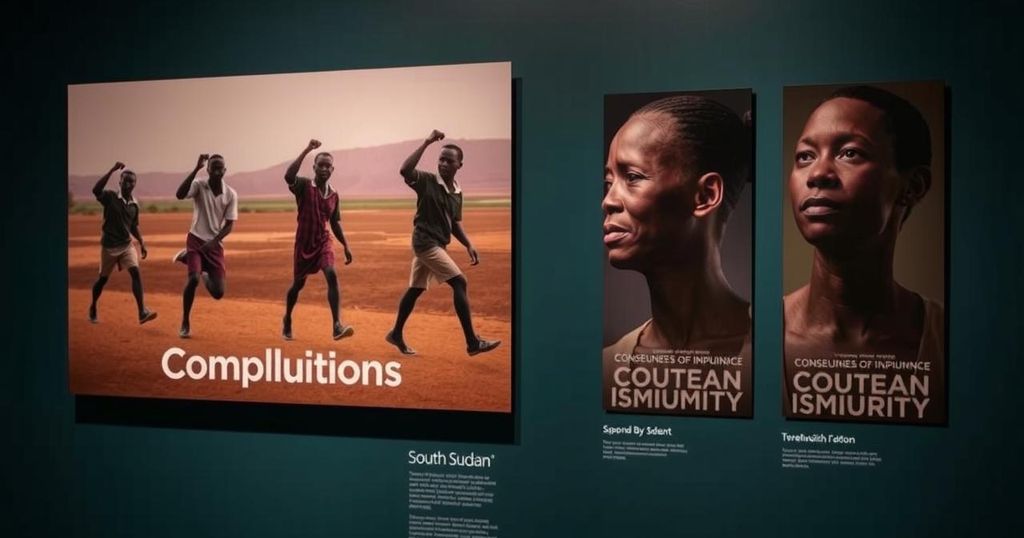The UN Commission on Human Rights in South Sudan has released a 19-minute report documenting the ongoing violence and human rights violations in the country, exacerbated by rampant impunity. This report marks the anniversary of the civil war that started in December 2013, calling for urgent transitional justice processes to address grievances and facilitate lasting peace.
On Sunday, the UN Commission on Human Rights in South Sudan released a poignant 19-minute video titled “The Unrelenting Cycle of Violence in South Sudan,” which highlights the persistent violence and significant human rights abuses exacerbated by widespread impunity in the nation. This report serves to commemorate the tragic anniversary of the civil war that erupted in December 2013. Utilizing harrowing testimonies from victims, the video sheds light on the profound suffering and devastation inflicted upon the South Sudanese populace, which continues to disrupt the cohesive fabric of their society.
The Commission’s report calls for comprehensive transitional justice mechanisms that encompass criminal accountability, truth-telling, reparations, and profound institutional reforms. Such measures are deemed vital to halt the ongoing cycle of violence and restore trust in governance. The statement underscores the necessity of a societal transformation that moves away from a climate of mistrust towards one grounded in sustainable peace, respect for human rights, and the rule of law. This transformative process, however, requires a long-term commitment from leaders and is hindered by deep-seated trauma and polarization.
Yasmin Sooka, Chair of the Commission, articulated the devastating impact that impunity has had on the nation’s stability, indicating that the lack of accountability has emboldened individuals to perpetuate heinous acts without fear of consequences. “Pervasive impunity has emboldened individuals to commit horrific crimes as they have no fear of retribution. The demand from South Sudanese civilians is clear: they want justice and reparations for what they have suffered. They have waited far too long,” she stated.
Despite attempts at peace through agreements made in 2015 and 2018, South Sudan continues to face significant violence—fuelled by ethnic divisions and the exploitation of elite interests. Commissioner Barney Afako noted that countless South Sudanese live under constant threat and that those responsible for ongoing atrocities occupy positions of power. He emphasized the urgency of implementing agreed-upon frameworks for truth and reconciliation, as well as the establishment of a Hybrid Court to address impunity.
The report underscores that without decisive actions from leaders aimed at fostering peace and justice, South Sudan will remain entrenched in conflict-related challenges. The need for a robust judicial system capable of addressing the monumental injustices faced by citizens is urgent. Commissioner Carlos Castresana Fernandez stated, “For the victims and survivors, the lack of accountability remains one of the most significant barriers to peace. Failing to end impunity is a failure of governance and leadership.”
As the anniversary of the civil war serves as a reminder of the heavy toll on civilians, the Commission asserts the necessity for national leaders to renew their commitment to establishing effective transitional justice processes that can eradicate the legacy of impunity gripping South Sudan.
The backdrop of the situation in South Sudan is marked by a prolonged civil conflict that began in December 2013. The violence has been driven by a complex interplay of political power struggles, ethnic tensions, and historical grievances. This turmoil has resulted in widespread human rights violations, including massacres, sexual violence, and countless instances of abuse against civilians. Despite several peace agreements, the country continues to grapple with instability. The UN Commission on Human Rights highlights these issues to call for a concerted effort towards accountability and the establishment of a functioning justice system that can address the needs of victims and survivors.
In summary, the UN Commission’s recent video report poignantly illustrates the dire state of human rights in South Sudan, underscoring pervasive violence and the detrimental effects of impunity on justice and accountability. The call for comprehensive transitional justice processes is imperative for fostering sustainable peace and rebuilding trust between the state and its citizens. Without a genuine commitment to addressing past injustices, the cycle of violence and mistrust will likely persist, further complicating the path towards reconciliation and stability in South Sudan.
Original Source: www.radiotamazuj.org






